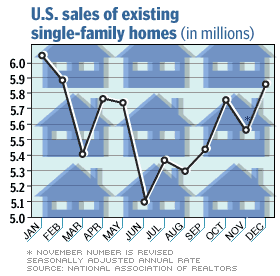NEW YORK (CNN/Money) -
The American appetite for habitation grew even stronger -- impossible as that seems -- in January, the government said Wednesday, renewing concerns that the U.S. housing market is in a dangerous bubble, like stocks in the 1990s.
Don't bet on it, economists say.
New home construction starts rose in January to an annual pace of 1.85 million units, the fastest pace in 16 years, according to a Commerce Department report, confounding economists' expectations for a decline.

Though the number of construction permits issued for new housing -- a leading indicator for the market -- fell, all of that weakness was in multi-family housing. Permits for single-family units, which make up about 80 percent of the housing construction market, rose 0.3 percent.
Last week, the National Association of Realtors said the median home price jumped 8.8 percent in the fourth quarter, the biggest gain in more than 20 years.
While the National Association of Home Builders (NAHB) said its index of builder optimism dipped a bit in early February, it still is at historically high levels, despite the kind of frigid weather in the eastern United States that ordinarily dampens construction activity.
"It would be tough to maintain the super-strong building pace recorded for the past several months," said NAHB President Kent Conine, a Dallas homebuilder. "But the market fundamentals remain solid, and the current level of builder optimism regarding the single-family segment reflects that."
Low mortgage rates fuel a boom
The biggest "market fundamental" in housing is mortgage rates at or near record lows. For several months, low rates have encouraged more home-buying, driving up demand for homes and pushing prices ever higher.
The housing market has, in fact, been one of the lone bright spots of an otherwise dreary economy. Higher home values have made homeowners feel wealthier, encouraging consumer spending, which makes up more than two-thirds of the total U.S. economy.
| Related stories
|

|
|
|
|
Low rates also have encouraged a frenzy of refinancing, which has allowed homeowners to lower their monthly payments and tap into their swelling home equity.
Meanwhile, corporate scandals and an agonizingly long bear market in stock prices have made home ownership even more attractive -- a house can't lie about quarterly earnings, and even if its value falls, at least you can live in it.
"As the equity market melted down, interest rates came down, and the housing sector has continued to thrive while the business sector has gone through hell -- and homes have to be filled up with goods, once they're bought," said Rory Robertson, interest rate strategist at Macquarie Equities USA.
Housing has been so relentlessly strong for so long that some observers occasionally fret that the market is artificially strong, that prices are due to suddenly collapse, crushing consumer confidence.
Bubble talk
But people have been wondering about a "housing bubble" since early 2001, and it hasn't popped yet.
For one thing, housing, like politics, is always local. There are some parts of the country -- Sacramento, we're looking at you -- where bubbles seem to have formed, with prices rising higher than the market apparently can support.
But on a national level, economists believe the supply of available housing is low enough to keep demand strong and keep prices from falling suddenly.
"1.85 million new homes being built per year in a population of 290 million and growing doesn't seem to be outrageous," Robertson said.
Economists warn that the housing market should slow down when interest rates start to rise, but that's not expected to happen for quite some time -- not until the situation in Iraq is cleared up, at the very earliest.
And the only thing that's going to bring interest rates up significantly in the short term is stronger economic activity, anyway, which will offset a good bit of the damage to the housing sector.
"If we're in a situation where rates are higher because the economy's great, the housing market is going to be last thing I'll be worried about," said Brown Brothers Harriman economist Lara Rhame, a former Fed economist.
For the most part, economists expect a gradual slowdown in the housing market through 2003 -- the National Association of Realtors, for example, thinks home-price growth will slow to 3.0 percent by the fourth quarter.
But one thing's for certain: the housing sector can't be the horse that pulls the world's biggest economy forever, especially if labor market weakness continues -- people have a hard time making mortgage payments when they don't have jobs.
"As the economy gets more and more dependent on housing being the key driver of growth, the economy becomes more and more vulnerable to that sector slowing down," Rhame said.

|

